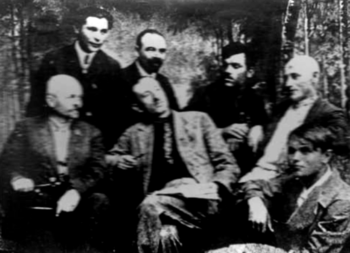 Global Information
Global InformationPavel Chioru information
Pavel Chioru | |
|---|---|
 Chioru (reclining, at center) with fellow writers, including Mihai Andriescu, Samuil Lehtțir, and Dmitrii Milev, c. 1930 | |
| People's Commissar for Education of the Moldavian Autonomous Soviet Socialist Republic | |
| In office 1928–1930 | |
| Personal details | |
| Born | Pavel Ivanovici Chioru-Ianachi 2 April 1902 Cartal, Bessarabia Governorate, Russian Empire |
| Died | Disputed (between 1937 and 1943) |
| Nationality | Soviet Moldovan |
| Political party | Communist Party of the Soviet Union (1919–1937) |
| Other political affiliations | Communist Party of Ukraine (Moldavia Regional Committee) |
Pavel Chioru, Chior, or Kior, known in full as Pavel Ivanovici Chioru-Ianachi[1][2][3] (Russian: Павел Иванович Киор-Янаки, or Павел Кьору; 2 April 1902 – c. 1937), was a Moldovan journalist, folklorist, and Soviet politician. He was among the Bessarabian youths who rejected that region's union with Romania, and consequently fled into the Ukrainian Soviet Socialist Republic, where he joined his communist father. Chioru Jr served in the Red Army and the Cheka, seeing action in the Russian Civil War; training as a political commissar, and known to the leadership of the Communist Party (CPSU), he emerged from the war as an author of Soviet propaganda with literary and musical preoccupations. His father became a founding figure of the Moldavian Autonomous Soviet Socialist Republic (MASSR), established in Ukrainian territory as a statement of Soviet territorial claims on Bessarabia; though Chioru Sr died in 1926, his son continued his political work, moving to Balta.
Chioru personally handled some of the core institutions of Soviet "Moldovenism"—a doctrine which held that Moldovans (or Moldavians) are fundamentally distinct from Romanians. These include the newspaper Plugarul Roșu, the literary magazine Moldova Literarî, and the local Writers' Union. Chioru was MASSR Commissar for Education between 1928 and 1930, and in this capacity worked to create a "Moldovan language" of the proletariat, principally by overstating differences between the Moldavian dialect and modern Romanian. He edited Gavril Buciușcan's dictionary, which stood as a moderate sample of Moldovenism, but around 1929 took personal charge of the project, endorsing in-depth cultural separatism through Russification of the vocabulary. In the earliest 1930s, Chioru was again moderating his outlook, recommending a literary language that was mostly influenced by the archaic dialect. This made him interested in selectively cultivating the classics of Romanian literature, Vasile Alecsandri and Mihai Eminescu. He earned attention in Greater Romania for his research into folklore, and was seen there as an unwitting champion of Romanian nationalism.
In 1932, Chioru backed the Soviet Latinization campaigns, whereby the Romanian alphabet was effectively adopted by the MASSR. His cultural activism was largely put on hold by 1934, when he took political offices in Rîbnița District and was possibly groomed to become a leader of the MASSR. This stint ended abruptly during the Great Purge, when he was labeled as a Romanian nationalist and Trotskyist. Expelled from the CPSU in March 1937, he was sentenced to death in October. He is known to have received a stay of execution, but his ultimate fate remains unclear. Official narratives, circulated at the height of De-Stalinization, have it that he died in the Gulag in 1943; they are questioned by authors who argue that he was more likely shot before the end of 1937.
- ^ Galushenko, p. 105
- ^ (in Romanian) Iurie Colesnic, "Scriitorii transnistreni între tragedie și minciună...", in Timpul, 14 August 2019
- ^ D. Virgil, "Stalinismul în destinele oamenilor", in Cuvîntul Libertății, 29 November 1990, p. 2